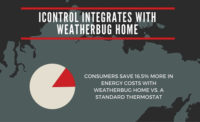New industry research from Icontrol Networks, provider of a widely-distributed connected home platform, found exceptionally high satisfaction among customers who opted for a do-it-for-me (DIFM) smart home solution.
Icontrol Networks’ DIFM Smart Home Survey revealed more than 96 percent of respondents report they are “very satisfied” or “satisfied” with their systems. Beyond satisfaction, those with professionally-installed solutions feel the cost is justified: Approximately 96 percent said they would purchase their systems againand 98 percent would still opt for professional installation today.
The report also found that security and peace-of-mind reign supreme during the decision-making process and are top motivating factors for customer retention, with general security concerns and specific security events being the top reasons most people purchase a system in the first place. Smart home security features also remained popular over time among those surveyed, with approximately 70 percent of total respondents using security system arming/disarming, video cameras and door lock control once a week or more.
“These survey findings validate the importance of the do-it-for-me market in smart home adoption overall, with incredible customer satisfaction rates from decision to purchase through use,” said Bob Hagerty, CEO of Icontrol Networks. “This data should be an eye-opener for what we can expect in the future of smart home adoption. No one size fits all when it comes to the smart home, and consumers want the option to choose what fits their lifestyles and needs.”
While 98 percent of respondents said their systems were easy to learn and use, most are still using their systems for single-device control instead of whole home automation where devices work together seamlessly. And although all providers mentioned in the survey offer systems with scheduling or automation features, only 29 and 35 percent of respective users thought their solutions offered these features, pointing to a lack of awareness around the offering. When asked about difficulty of usage, most customers reported setting alerts, schedules and automation rules as the most difficult features of the system to use.
“DIFM smart home technology platforms have the capacity to take on myriad devices that cover appliances, entertainment, health and fitness and more to create true whole home automation,” continued Hagerty. “The emerging opportunity for DIFM service providers is to educate customers on the possibilities.”
Additional findings include:
-
DIFM customers less concerned with security and data breach
- While security and data concerns continue to be the most buzzed-about smart home topics, these proved to be less of a concern for DIFM customers. Of the total respondents: 97.4 percent agree or strongly agree that their system will not be accessed illegally and nearly 91 percent agree or strongly agree that their data will not be used for marketing purposes.
-
Reputation matters
-
Most customers who purchased a smart home system were already proactively looking for a system, but when it came to picking a provider, reputation proved to matter.
- When asked why they chose their service provider, more than half (60 percent) cited the reputation of the company.
- When evaluating systems, most went to websites (72 percent) or recommendations by family/friends (51 percent), and 43 percent found more information via advertising.
-
Most customers who purchased a smart home system were already proactively looking for a system, but when it came to picking a provider, reputation proved to matter.
-
Convenience and ease of use drive feature usage
-
Respondents reported varying reasons for installing additional products or features (such as thermostat, garage door, lighting system, speakers, etc.), but convenience and ease of use was a main driver, especially for women’s use of garage door control.
- Usage of lighting/appliances and thermostat were driven by convenience, 62.1 percent and 45.3 percent, respectively. Ease of use drove customer usage of door lock and garage door control features as well, at 37.4 percent and 36.6 percent, respectively.
- While less than a quarter of respondents installed third-party devices, those that did were most likely to install smart thermostats, smart garage doors and Amazon Echo. Convenience and environmental concerns were the most cited reasons to install these third-party features.
-
Respondents reported varying reasons for installing additional products or features (such as thermostat, garage door, lighting system, speakers, etc.), but convenience and ease of use was a main driver, especially for women’s use of garage door control.
-
Quality product materials and helpful customer service equate to higher satisfaction
-
Customers are relying on materials supplied by service providers to learn the system, which indicates the importance for companies to develop appropriate education documentation. The data also shows that once customers have had their system for some time, they turn to customer support to troubleshoot — indicating that a knowledgeable tech support team is invaluable.
- Most customers printed instructions (59 percent) to learn their systems, as well as the online user guide (54 percent).
- When it comes to troubleshooting issues, customers overwhelmingly relied on customer service/technical support (76 percent of total).
-
Customers are relying on materials supplied by service providers to learn the system, which indicates the importance for companies to develop appropriate education documentation. The data also shows that once customers have had their system for some time, they turn to customer support to troubleshoot — indicating that a knowledgeable tech support team is invaluable.
Icontrol also releases an annual report on the complete State of the Smart Home. Visit www.stateofthesmarthome.com for information.
Methodology
Icontrol Networks’ DIFM Smart Home Survey examines smart home customers’ path to purchasing a professionally-installed and monitored smart home service. The findings are based on data collected by a third-party research firm from 552 respondents across seven branded smart home solutions — including solutions powered by Icontrol Networks as well as other technology providers. Participants were required to be at least 25 years old, a homeowner and own a security system with home automation. The margin of error for the total sample is +/- 4.4 percent at a 95 percent confidenceinterval.





